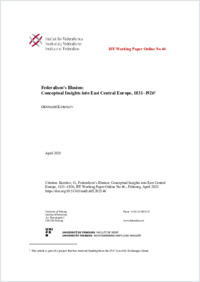Federalism’s Illusion : Conceptual Insights into East Central Europe, 1831–1926
BFD
- Fribourg : IFF, 2025
English
This paper explores the ideological use and limited implementation of federalism in East Central Europe from 1831 to 1926, a region shaped by diverse national identities and the dominance of imperial powers. Federalism, widely promoted as a potential solution for unifying multiethnic societies under a shared political framework, primarily served as a rhetorical device rather than a practical model for governance. National movements and emerging states leveraged federalist ideas as tools to legitimize territorial claims, secure political authority, and establish cultural autonomy from imperial structures. However, the paper argues that national leaders consistently subordinated federalist principles to the pragmatic demands of nation-building, which prioritized ethnic and linguistic homogeneity. Despite federalism’s appeal as an inclusive model, its adaptation in East Central Europe was constrained by nationalist agendas, anti-imperial sentiments, and the instrumentalization of ideology for geopolitical maneuvering. This study highlights how federalist discourse in East Central Europe evolved from a utopian concept into an element of Realpolitik,illuminating broader tensions between ideology and practical governance in the region's history.
- Collections
- Faculty
- Faculté de droit
- Department
- Institut du Fédéralisme
- Language
-
- English
- Classification
- Law, jurisprudence
- Series statement
-
- IFF Working Paper Online ; 46
- License
- Open access status
- diamond
- Identifiers
-
- DOI 10.51363/unifr.diff.2025.46
- ISSN 2813-5261
- Persistent URL
- https://folia.unifr.ch/unifr/documents/331551
Statistics
Document views: 182
File downloads:
- 46_Gennadii Korolov.pdf: 206
